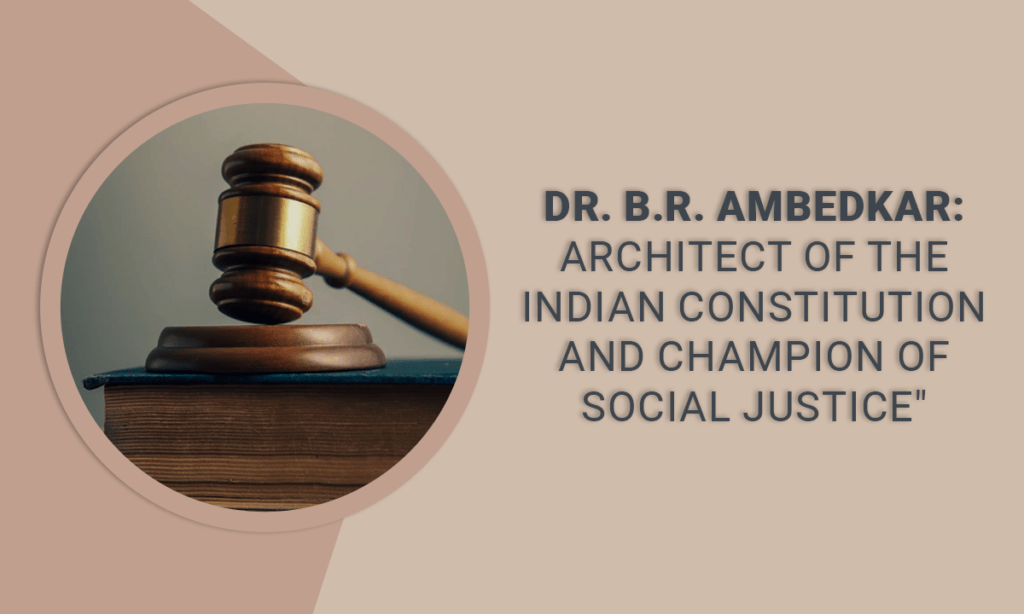Introduction
Dr. Bhimrao Ramji Ambedkar, widely known as Dr. B.R. Ambedkar, was a visionary leader, jurist, social reformer, and the chief architect of the Indian Constitution. Born on April 14, 1891, in Mhow, Madhya Pradesh, India, he became a symbol of hope for millions of marginalised and oppressed people in India. His life and work were dedicated to securing justice, equality, and human rights for the oppressed communities in India, especially the Dalits (formerly known as untouchables). Dr. Ambedkar’s tireless efforts in shaping the Indian Constitution and advocating for social justice continue to inspire people all over the world.
Championing Social Justice
Dr. Ambedkar’s relentless pursuit of social justice led him to become an influential figure in the Indian freedom struggle and the leader of the Dalit community. His commitment to eradicating the oppressive caste system and securing fundamental rights for all led to several social and political movements, including the Bahishkrit Hitkarini Sabha (Outcastes Welfare Association) in 1924 and the Scheduled Castes Federation in 1942. His most significant contribution, however, came in law and constitution-making.
Architect of the Indian Constitution
One of Dr. Ambedkar’s most enduring legacies is his role as the chairman of the Constituent Assembly of India and the chief architect of the Indian Constitution. He was chosen for this role because of his exceptional legal acumen and unwavering commitment to social justice. He led the Constituent Assembly in drafting a constitution that would be a beacon of equality and justice.
Key Contributions to the Indian Constitution
Fundamental Rights: In the Indian Constitution, Dr. Ambedkar played a pivotal role in drafting the section on Fundamental Rights. These rights, including the right to equality, freedom of speech, and protection from discrimination, were designed to provide every Indian citizen with equal rights and opportunities.
Reservations: Dr. Ambedkar advocated for affirmative action measures, such as reservations in educational institutions and government jobs, to uplift historically oppressed communities. These protections, known as “Scheduled Castes” and “Scheduled Tribes” reservations, were incorporated in the Constitution to remedy historical injustices and provide a level playing field.
Abolition of Untouchability: The Indian Constitution explicitly banned the practice of untouchability and declared it a punishable offence. This was a significant step toward dismantling the caste-based discrimination deeply rooted in Indian society.
Promotion of Social Justice: Dr. Ambedkar emphasised the importance of social justice and the principles of equality and non-discrimination in all aspects of Indian life.
Political Legacy
After the adoption of the Indian Constitution in 1950, Dr. B.R. Ambedkar continued his political career. He served as the first Law Minister of independent India in Jawaharlal Nehru’s cabinet. His contributions extended beyond constitutional law and social justice; he also worked on various labour and economic reforms.
Despite his immense contributions to the nation, Dr. Ambedkar faced opposition and discrimination throughout his life, yet he remained a staunch advocate for the rights of the oppressed and downtrodden until he died in 1956.
Final Words
Dr. B.R. Ambedkar’s legacy as the architect of the Indian Constitution and a champion of social justice is immeasurable. He played a critical role in shaping the democratic values of modern India, and his vision for an inclusive and egalitarian society continues to inspire movements and individuals dedicated to social justice worldwide.
His life story is a testament to the power of education, resilience, and unwavering commitment to a just and equal society. Today, his contributions are celebrated annually on Ambedkar Jayanti, and his teachings and writings continue to guide those striving for a more equitable world.
People Also Read: Analysing Dr. Ambedkar’s Views on Democracy and Social Justice

Pingback: Empowering Bystanders: Training Programs for Effective Emergency Response - Sankalp Bhoomi Trust
Dalit is a word Dr.B.R Ambedkar refused to use on the Constitution to indicate the Scheduled Castes the former untouchables of the Hindu Caste System.
The Union of India and the National Commission of Scheduled Castes issued orders not to use the word Dalits to indicate the Scheduled Castes for any official purpose. Dalit is a word popularised by the Catholic Bishops Conference of India to grab the Scheduled Castes status and Scheduled Castes reservation for the Christians converted from Scheduled Castes professing Hinduism. The Dalits Christians and the Dalit Muslims are not eligible and entitled for the Scheduled Castes status Scheduled Castes Reservation since both Christianity and Islam are casteless Religions all over the World.
So please delete the word Dalit from the write up on Dr.B.R. Ambedkar since it is a misnomer.
Adv. Balan.K.A.
High Court of Kerala.
Wow, what an inspiring tribute to Dr. Ambedkar! 🙌 His relentless fight for social justice and his visionary work on the Indian Constitution continue to light our path today. 🏛️💪 Thank you for sharing this beautiful reminder of his legacy! 😊🙏